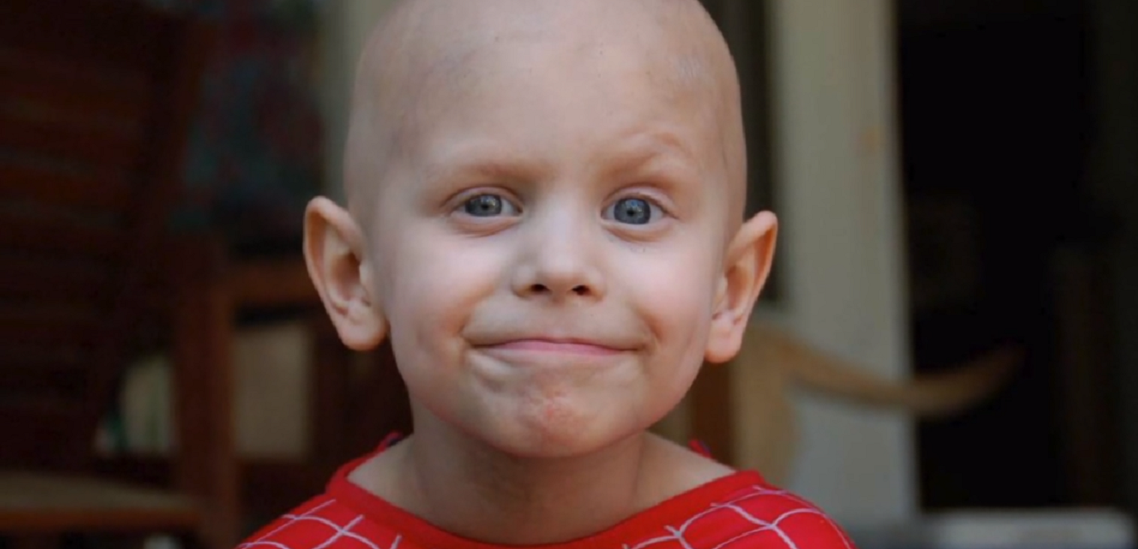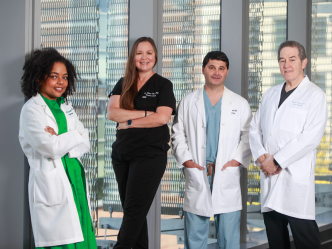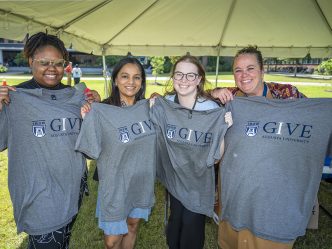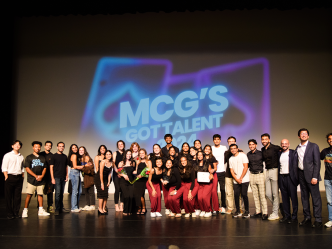When Patrick Chance smiles, you can’t help but to root for him.
He’s a handsome child. Tall for his age, he was blessed with one of those classic boyhood grins – the sort of smile we convince ourselves exists only in fond memories and Saturday morning commercials. His nose is button small. His dimples have dimples of their own. And if his river-blue eyes weren’t already brimming with life, you’d swear they’d break you with their sadness.
He’s also a fighter.
It’s written all over his face. You can see it in the way he carries himself, in the way he talks and the way he laughs. He’ll go places one day. There’s no doubting that. And no matter what, he will never, ever stop fighting.
But that Patrick lives only in photographs, now.
In 2012, Patrick Chance lost his battle with neuroblastoma, a form of cancer that develops from immature nerve cells found throughout the body. He passed peacefully in his sleep at the age of nine, but for six long years, he fought against an enemy he couldn’t see. The fight that claimed his life was never a fair one. His cancer was Stage Four before doctors ever found it.
Today, his story is an all-too-familiar one.
Every year, more than 10,000 children in the United States are diagnosed with pediatric cancer.
Some cancers, like acute lymphoblastic leukemia (ALL), can be cured given enough warning. Others, like neuroblastoma – which lacks outward symptoms – can be deadly.
Often, by the time children show any signs of illness, the dice have already been thrown.
Thankfully, though, due to the efforts of a few local heroes, someday those dice might be loaded in the children’s favor.
Press On is a field-of-interest fund that invests in medical research focused on finding less toxic therapies for neuroblastoma and acute myeloid leukemia, two of the deadliest forms of pediatric cancer. A donor-advised fund of The Community Foundation for the Central Savannah River Area, Press On also has the distinction of being run in part by two former Augusta natives – Patrick Chance’s parents, Stephen and Erin.
The couple began their fundraising effort shortly after their son was diagnosed.
“It became obvious to us that there was minimal federal funding of childhood cancer research,” said Erin Chance, recalling with a fragile smile the period shortly after her son’s diagnosis.
In many ways, she resembles her fallen son. Both have the same characteristic sun-kissed hair. Both are tall and possessed of easy smiles, despite the hardships they’ve endured. But one minor difference separates them. Where Patrick was a fighter, his mother, Erin, is a warrior. Today, she bears the emotional scars of a lifelong campaign, the effort to see childhood cancer eradicated forever.
“We started fundraising efforts soon after through our local community to raise money to fund clinical trials here in Atlanta,” she said. “Out of those efforts, Press On grew.”
The Chances’ war began in June of 2006.
It wasn’t the sort of day you’d expect to bring bad news. In fact, for a summer day in Georgia, it was actually almost bearable.
“I just remember it was one of those beautiful clear Southern days,” said Erin, pursing her lips together thoughtfully. “The sky was as clear as it could be, and we were in this tiny little hospital room when the doctor came in and told us our son had cancer.”
At first, the Chances were told their son had a very curable form of cancer.
“The doctor left, and we told our family the bad news. Patrick had a type of leukemia, but it was a very treatable type,” she said. The Chances rallied, vowing that they’d get through it. They’d all fight. They’d all win.
But childhood cancer is especially cruel.
At the time of Patrick’s diagnosis, there was no widely recommended way of screening a child not already at risk of developing cancer. Patrick’s parents were both healthy, his sisters were strong and well. Outside of their obvious shock, there was no reason for the Chances to think anything more of their son’s diagnosis. Until it changed.
“About thirty minutes later, the doctor came back in,” said Erin. “He told us, ‘I’m sorry, I have to tell you something different.’”
Doctors told Erin that Patrick’s cancer, less than an hour diagnosed, was actually Stage Four. To make matters worse, they also weren’t sure what type of cancer it was.
Naturally, the Chances were devastated.
“I remember thinking how can it be so beautiful outside,” said Erin, wiping the first traces of a tear from her eye. “How can it be so beautiful when there’s all these families receiving news like this?”
But though their fight began in despair, the Chances wouldn’t fight alone for long.
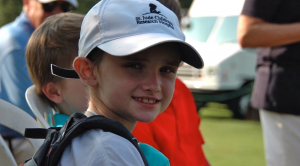
In 2008, Brennan Simkins was a quiet child. He was bashful, reserved. Some would say humble. The only exception was when fate happened to bring him to the golf course. There, and only there, he reigned with a sort of silent pride.
But in January of 2009, Brennan received news that would forever change his life.
After weeks of inexplicable fatigue, he was diagnosed with acute myeloid leukemia (AML). At the time, he was just days short of his seventh birthday.
The diagnosis was crushing.
Turner Simkins, Brennan’s father, said he remembered feeling an unbelievable sense of dread after learning about his son’s diagnosis.
“It seems silly, but I remember thinking right after … I’m never going to see him grow up to be a golfer,” he said, bowing his head as his eyes welled up with tears.
But where some families would have given up, the Simkins turned to their friends for support. Luckily, those friends happened to be the Chances.
“We had been great friends for years, and we had been supporting one another through these great battles,” said Tara Simkins, Brennan’s mother. “We knew that, instead of fighting alone, we now had a reason to fight together.”
That reason was a shared concern.
Acute myeloid leukemia (AML) is the most common secondary cancer diagnosed in pediatric cancer patients. At the time of Brennan and Patrick’s diagnoses, chemotherapy treatments were so toxic that up to 10 percent of all pediatric cancer patients developed AML in response to their original treatment.
If Patrick survived his treatment, there was a high likelihood he would develop AML. If Brennan survived his original AML diagnosis, there was a strong chance it might come back. Faced with not one but two potential killers, the Chances and the Simkins made the only reasonable decision.
They joined forces.
The name Press On has tremendous significance to both the Chances and the Simkins for a multitude of reasons. In that simple phrase are contained the ideas of countless leaders and prophets, wise men and guardians. Even presidents.
“There’s a terrific quote that sums up what we stand for,” said Tara. “It goes something like ‘The only things that have ever saved the human race were perseverance and the desire to press on.’”
The original quote, delivered by former president Calvin Coolidge to the Women’s National Committee for Law Enforcement in 1933, is just a touch longer. It reads:
“Nothing in this world can take the place of persistence. Talent will not; nothing is more common than unsuccessful men with talent. Genius will not; unrewarded genius is almost a proverb. Education will not; the world is full of educated derelicts. Persistence and determination alone are omnipotent. The slogan Press On has solved and always will solve the problems of the human race.”
Though a powerful sentiment, according to Simkins, the attribution to Coolidge came well after the fund was named. In fact, the original reference comes from a source much closer to both families’ hearts.
“Stephen always used to sign off on his care pages with Press On,” she said, referring to the blog posts Stephen Chance would pen regarding his son’s treatment and condition. “It comes from Paul’s letter to the Philippians.”
The original passage reads:
“Not that I have already obtained, or am already made perfect; but I press on, if it is so that I may take hold of that for which also I was taken hold of by Christ Jesus.” – Philippians 3:12
The message speaks to perseverance as a way of living and growing closer to Christ. It’s a fitting piece of scripture, especially to Stephen Chance.
After all, in life, his son wanted nothing more than to follow in Christ’s footsteps.
“I think any time a kindergartener says they want to grow up to heal people, it gives you a glimpse into what he was thinking about,” said Chance, flashing a more refined version of his son’s signature smile. “He loved nature, and he loved fishing. But he wanted to heal people. That says something.”
In 2012, when Patrick passed, the Chances understood they couldn’t allow their mission to die with him.
In part, they said they carried on in his memory.
“He wasn’t there to heal people anymore,” said Erin Chance. “But we are, and we could be his hands on Earth.”
That’s what she says they are every time her family gives: her son’s hands on Earth.
But the Chances say the other reason they carried on was because they still had one young soldier left in the fight.
As Patrick’s battle was coming to an end, in many ways, Brennan’s was just beginning. The Simkins, like the Chances, were having to travel across the country for treatments, many of which were costly and ineffective. Their hopes were fading. Having already endured three myeloablative transplants in a little over a year, Brennan’s condition was worsening steadily, and the family’s options were dwindling fast.
Through it all, though, Brennan never lost his will to fight.
“Attitude has a lot to do with everything,” said Turner Simkins. “He’s a fighter, and that’s pretty simple.”
Brennan never complained about his treatments. He never griped or groaned, or asked “Why me?” In fact, the closest he ever came to complaining was on the eve of his darkest hour.
On the way to Memphis for a routine checkup, Brennan asked the one question no parent ever wants to hear. “Am I going to die?” Loving but realistic parents, the Simkins did what they could to dance around the subject, and for a time, they succeeded.
Two days later, though, they found out their son had relapsed for the second time. Their options had reached an all-time low.
Turner Simkins remembers well how he felt after that particular visit. Because of Brennan’s overall health, there was only one option left for treatment, and in this instance, the cure was as deadly as the disease. Brennan would need a fourth bone marrow transplant. To that point, no child had ever received so many so quickly.
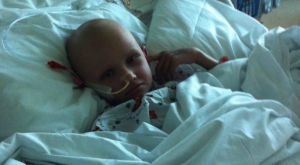
“We were told his chances of surviving didn’t even register,” said Simkins. “The body needs time to heal after a transplant, usually a year or so. Brennan underwent three in less than eighteen months. We were so worried that it would break his spirit.”
Until that point, Turner said his son had begun distracting himself with competition. At first, he lost himself in golfing, a sport he had always excelled at. Then, when the illness left him too weak to play, he took up video games, then cards – anything and everything that would allow him to fight back in his own unique way. In short, Brennan Simkins was addicted to winning. But could he win against fatal odds?
The Simkins said there was no other choice. Drained, worried and quickly losing hope, they bet everything they had left on their little boy.
“We understood we were out on a limb,” said Turner. “And the limb was creaking. But it was the only choice.”
Turner said during that period, he kept thinking back to his son’s question:
Am I going to die?
“I walked from the room where we’d spoken to the physician’s assistant and the head of transplant, after Tara and I had had this very frank conversation,” said Turner, struggling to find his words. “We knew the team was split on whether or not to proceed. I wanted to gather myself, so I left the parent room and walked down the hallway. While I was there, I happened to look into the fishbowl.”
The “fishbowl” was the name hospital staff had given to the conference room near the transplant ward. Named both for its peculiar shape and for the staff’s habit of peeking in through the room’s long viewing window, the fishbowl was a common hangout for transplant doctors on break. On that day, though, the room’s venetian blinds hid a very particular inhabitant.
“I looked in and saw the physician’s assistant who’d been talking to us just a few minutes before,” said Turner, his eyes weary, distant. “She was … weeping. I thought, ‘my god, how do they do this?’”
His thoughts raced.
How does a father explain death to his child, he wondered? How do you tell someone who’s fought so hard and for so long that they might not be able to keep fighting and that the choice is entirely out of their hands? He said the thought of making such a decision was enough to break him.
“The demons,” he said, shaking his head. “It was about learning to chase those personal demons away.”
But when he returned, Turner said his son had moved beyond worries over life and death. In his father’s absence, Brennan had made up his mind. He wanted the transplant regardless.
“He answered his own question,” Turner said, beaming with fatherly pride. “He wasn’t going to die if he could help it.”
And he didn’t.
The fourth transplant – an operation which, at the time, was unheard of – was a huge success.
The hope of Press On is that every child might have the same opportunities to fight that Brennan had. The organization also hopes children can someday start receiving those opportunities where they’re needed most. Here at home.
After all, that was perhaps the most surprising thing about Patrick and Brennan’s treatment. When the Chances first started putting together their son’s national cancer treatment team, they realized early on that something important was missing from their “Dream Team.”
“One of Patricks’ doctors was leading this consortium, and I noticed that no hospital in Georgia was included,” said Stephen Chance. “I called him and asked him how might Georgia be included, and he explained to me that one thing the dream team was lacking was an expert in immunotherapy, or vaccine therapy, for pediatric cancers.”
As it happened, Georgia had one such expert, and he was located somewhere very near and dear to the Chances’ hearts. That expert was Dr. Samir Khleif, director of GRU’s Cancer Center, right here in Augusta.
The next step was putting money in the right hands, and that’s just what Press On has done. On Sept. 3, Press On presented a $2.5 million gift to GRU’s Cancer Center in hopes of putting a stop to pediatric cancer once and for all. In the coming years, the money will be used to fund the Press On Translational Pediatric Oncology Program.
“The motivation of this gift is really to raise Georgia to the national stage in pediatric oncology treatment,” said Stephen Chance. “There was that opportunity to elevate GRU on the national stage if we could build a translational research program at GRU to support our vision, and that’s one component.”
The other component came in the form of Tony and Jeannie Loop.
Two CSRA residents with a desire to see children with cancer healed, they, too, had a good reason to join forces with the Chances. Like the Chances, the Loops are also well acquainted with suffering.
“Our son, Angelo, is the reason we do anything,” said Tony, overcome by tears. Racked by slow, quiet sobs, he held up a hand in a show of apology, a testament to his powerful personality.
“If we can help one child with this gift,” said Jeannie, “then that’s what we want to do.”
And that gift was substantial.
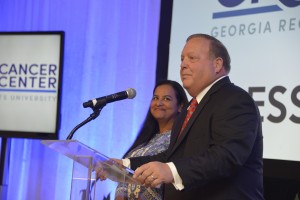
The lion’s share of Press On’s $2.5 million donation came from the Loops, and the company that Jeannie founded – the JANUS Research Group. While impressive, the couple said the amount was insignificant compared to seeing the CSRA community contribute to a worthy cause.
“It’s always nice to be a part of something bigger,” said Tony when asked about the possibility of his family’s donation leading to a cure. “But I would really say that Patrick and Brennan will be the ones who planted the seed. Through Patrick’s sacrifice of his life, and the battle that Brennan’s currently continuing. Well, we’ll be happy to be a part of that legacy.”
Today, Brennan lives his legacy. His cancer, once the biggest worry in his life, is now in remission. He lives at home with his family and has begun to play golf again. The going is tough, but his father says his health is improving day by day. Just like his game.
And though he never got the chance to go home, in his own way, Patrick lives his legacy as well.
He lives it through his sisters, Anna and Madison, who revel in his memory.
He lives it through his parents, Erin and Stephen, who fight, and will continue to fight, until pediatric cancer is a memory.
And he lives it through donations to cancer research. Especially those driven through Press On.
His parents say every dime of the money they receive goes where it’s needed most – into the hands of researchers – something they say will never change.
“So often you hear about how donation money is wasted or mismanaged,” said Stephen. “Well, Press On is just us. We don’t keep it. The money goes where it can do the most good.”
The Patrick you would have rooted for is gone. That will never change. He will never grow older. He will never ease into his father’s smile. And while his family and friends continue to press on in his stead, life holds no further mysteries for him.
He lives only in photographs now.
But the boy who wanted to heal? The little fisherman who wanted to see others live free of suffering?
He lives on. And he will, in the form of Press On, long after pediatric cancer is beaten.
Until then, though, his work here remains unfinished. Until then, his family and friends will continue to be his hands here on Earth. And until then, like Brennan, they’ll keep fighting until they win.
Because even in photographs, when Patrick Chance smiles, you can’t help but to root for him.
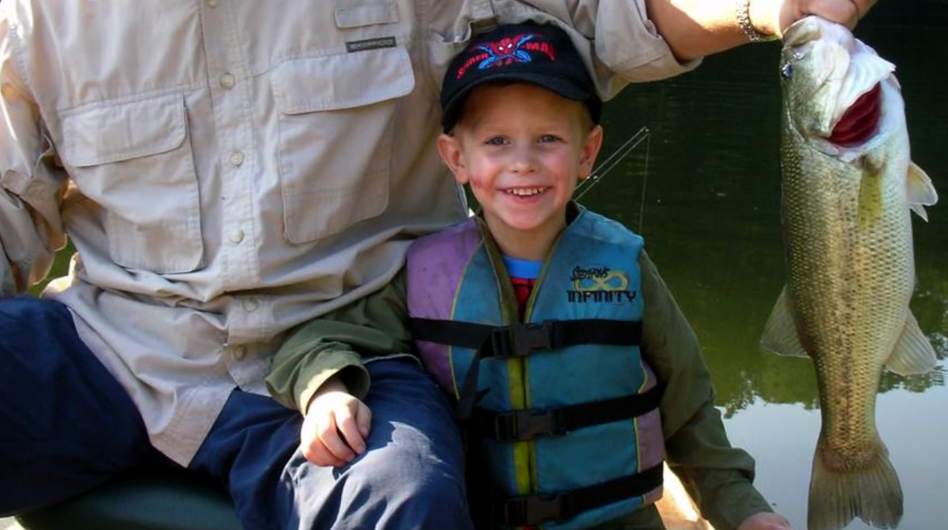
 Augusta University
Augusta University
